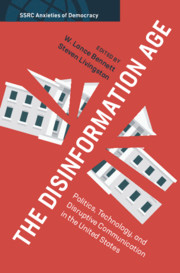Acknowledgments
This volume originated in two workshops sponsored by the Media and Democracy Program of the Social Science Research Council. The working title for those gatherings was “Media, Technology, and Democracy in Historical Context.” The first meeting of contributors was held in December 2018 at George Washington University in Washington, DC. A second meeting was held in October 2019 at the SSRC in New York. In the planning for the workshops we were advised and supported by the SSRC’s Kris-Stella Trump (now a professor at the University of Memphis) and Michael Miller, program director for the Just Tech and the Media & Democracy programs at the SSRC. Michael provided insightful advice throughout the long process of turning the rich exchange of ideas shared during the workshops into this volume. We also wish to thank Jason Rhody, director of the Digital Culture program, Social Data Initiative, MediaWell, and co-director of the Media & Democracy program at the SSRC, for his support of the project.
It has been a joy to work with our creative and patient contributors. Though our workshop debates were sometimes lively – as good intellectual exchanges ought to be – we all shared common cause in seeking to understand the current challenges to democracies. We also appreciate the dedication and patience each contributor brought to multiple rounds of edits and refinements of arguments. Jane Mayer of the New Yorker joined our meeting in Washington, DC and offered her valuable perspectives in a separate panel discussion that also included Naomi Oreskes, Yochai Benkler, and Paul Starr. The discussion was masterfully led by SMPA’s Frank Sesno.
At Cambridge University Press we wish to thank Sara Doskow for her guidance and enthusiasm about the project. Two anonymous reviewers offered useful criticisms that helped us sharpen and refine our arguments. Erin Sedita at the Institute for Data, Democracy and Politics at GWU offered invaluable assistance in getting the manuscript in shape for publication.
Finally, we acknowledge the many colleagues around the world who have inspired our work. It is gratifying to see the emergence of a community of scholars dedicated to understanding the relationships among legacy media, social media platforms, publics and political institutions in strengthening democracies.
